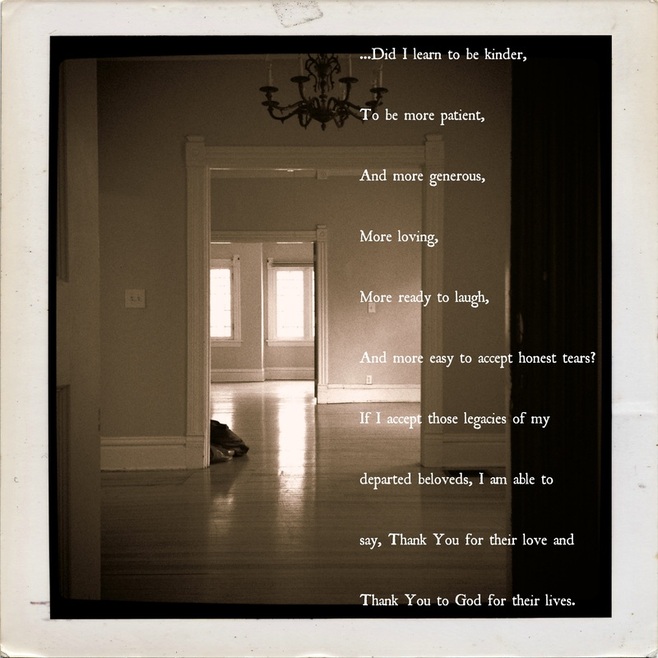| Maya Angelou passed away today. This is sad news of course, but this is also a clear-cut case of a life worthy of celebration as much as mourning. What a legacy she leaves behind! Until her story was told today all over the place in elegy, I didn't realize how personally and how fully she had embodied Fear as Teacher--experience as fuel for connection and personal growth, adversity as gris for the creative mill. When she was seven years old, Angelou was raped by her mother's boyfriend. When she reported this crime, the perpetrator was beaten to death by an angry mob. In an interview years ago, Angelou said that her seven year old reasoning determined it had been her own voice that killed the man, and so she stopped talking for almost six years after that--penance, or maybe protection. What a beautiful turn, then, that her language, her strong emerging voice would become her art and her power. | |
Maya Angelou used her creativity and that once-stifled, self-empowered voice to plant seeds and harvest change throughout the Civil Rights Era, harmonizing with other strong voices like Rosa Parks, Malcolm X and Martin Luther King. Her voice, her art, her creativity and consciousness were bolstered and infused by the challenges she encountered and the losses she endured. Her experience, and her willingness to share the human truth of it, leaves a legacy now that has literally traveled the globe and will continue to do so for generations to come.
While thinking about Angelou and about legacy today, I perused some of her writing, leafing through books of poetry I've treasured for decades now, spines so bent and handled that the titles are difficult to discern. Turning pages, savoring favorite stanzas, I feel grateful for creativity's gentleness and its force, the way it can slip in an aesthetic side door and take a whole set of disfunctions and complacencies by storm. I'm thankful for learning the word "invectives" in fifth grade from Angelou's poem "The Lie," at just the moment I needed it, when family disruption could've turned more sinister than an expanding vocabulary and some sad but inspired poems scribbled in angsty journals. I'm grateful for "The Telephone" and its perfect company through the wilderness of unrequited adolescent romance. I'm grateful, everyone in their right mind is grateful, for Angelou's ability to still rise, up from a past that's rooted in pain, the dream and the hope of the slave, to rise, to rise, to rise. And I'm grateful too for a blurb from a chapter in Angelou's Letter to my Daughter called "Mrs. Coretta Scott King," where Angelou guides us generously down the grief path toward growing a good life:
I am besieged with painful awe at the vacuum left by the dead. Where did she go? Where is he now? Are they, as poet James Weldon Johnson said, 'resting in the bosom of Jesus'? If so, what about my Jewish loves, my Japanese dears, my Muslim darlings. Into whose bosom are they cuddled?
I find relief from the questions only when I concede that I am not obliged to know everything. I remind myself it is sufficient to know what I know, and that what I know, may not always be true.
When I find myself filling with rage over the loss of a beloved, I try as soon as possible to remember that my concerns and questions should be focused on what I learned or what I have yet to learn from my departed love. What legacy was left which can help me in the art of living a good life...
While thinking about Angelou and about legacy today, I perused some of her writing, leafing through books of poetry I've treasured for decades now, spines so bent and handled that the titles are difficult to discern. Turning pages, savoring favorite stanzas, I feel grateful for creativity's gentleness and its force, the way it can slip in an aesthetic side door and take a whole set of disfunctions and complacencies by storm. I'm thankful for learning the word "invectives" in fifth grade from Angelou's poem "The Lie," at just the moment I needed it, when family disruption could've turned more sinister than an expanding vocabulary and some sad but inspired poems scribbled in angsty journals. I'm grateful for "The Telephone" and its perfect company through the wilderness of unrequited adolescent romance. I'm grateful, everyone in their right mind is grateful, for Angelou's ability to still rise, up from a past that's rooted in pain, the dream and the hope of the slave, to rise, to rise, to rise. And I'm grateful too for a blurb from a chapter in Angelou's Letter to my Daughter called "Mrs. Coretta Scott King," where Angelou guides us generously down the grief path toward growing a good life:
I am besieged with painful awe at the vacuum left by the dead. Where did she go? Where is he now? Are they, as poet James Weldon Johnson said, 'resting in the bosom of Jesus'? If so, what about my Jewish loves, my Japanese dears, my Muslim darlings. Into whose bosom are they cuddled?
I find relief from the questions only when I concede that I am not obliged to know everything. I remind myself it is sufficient to know what I know, and that what I know, may not always be true.
When I find myself filling with rage over the loss of a beloved, I try as soon as possible to remember that my concerns and questions should be focused on what I learned or what I have yet to learn from my departed love. What legacy was left which can help me in the art of living a good life...
P.S. I highly suggest you listen to Maya Angelou read her poem "Phenomenal Woman."

 RSS Feed
RSS Feed